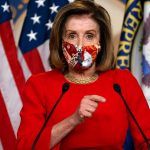
Holy Pork, Batman!
The Democrats didn’t waste any time in filling back up the swamp.
Earmarks have a long and litigious history in Washington. Earmarks were banned in 2011 after several high-profile corruption scandals.
Believe it or not, the Republican Party in the pre-Trump era had been working to drain the swamp (maybe not fast enough) when the GOP took control of Congress in 2010 and abolished the corrupt earmarking process.
Earmark pork has given us such legislative fat as the infamous Alaska “bridge to nowhere,” make-work jobs for Democratic constituents in inner cities, and other instances of corrupt “largesse” and favor doling by members of Congress to the special interests within their constituencies.
Throughout the Donald J. Trump presidency, the Democratic Party repeatedly decried what they claimed was insider dealing, cronyism, and the use of government as a bank account for special interests.
Now the party that preaches “unity” and gives lip service to “good government” wants to revive the once-dead practice of earmark pork, so they can bring back pork projects, bringing home the bacon for their district and buying votes.
The Democrats are the most thoroughly corrupt party in the history of America.
Senate Appropriations chair and octogenarian Patrick Leahy (D., Vt.) and House Appropriations chair and the only member of Congress with purple hair, Rosa DeLauro (D., Conn.), are leading the charge to bring earmarks back into the appropriations process. Alas, the legislative sausage-making process gets uglier.
The late Senator Tom Coburn of Oklahoma – may he rest in peace – led the movement in 2010 to banish earmarks from spending bills.
Senator Coburn is on the record stating that earmarks serve as “a gateway drug on the road to the spending addiction.” Senator Coburn also emphasized how many members of Congress often feel obligated to vote for pork-fattened and bloated spending bills out of fear that their district or state would be penalized if they went against the party bosses.
When Ronald Reagan vetoed a spending bill in 1987 that was stuffed to the gills with porky earmarks, he quoted the second president of the United States and Founding Father Thomas Jefferson, who warned that empowering Congress to spend federal monies on local projects and interests would spark “a scene of scramble among the members [for] who can get the most money wasted in their State, and they will always get most who are meanest.”
Thanks to the Democrats, bacon is now back on the congressional menu.
“Chair DeLauro supports Member-directed funding for community projects,” said Evan Hollander, a spokesperson with the House Appropriations Committee, which is charged with doling out federal funds.
In recent years, Democratic lawmakers have attempted to “rebrand” the corrupt practice of earmarks as “Community-Focused Grant Programs” or with jargon-loaded phrases such as “member-directed spending.”
Democrats have not stated what, if any, restrictions they will put around earmarks; however, it is reported that the funding will be limited to nonprofits and municipalities, but not private companies. This doesn’t exactly assuage proponents of fiscally responsible government, given that just because an organization is a nonprofit doesn’t mean they aren’t a special interest or a potentially corrupting influence on Washington D.C. lawmakers (for example, the Clinton Foundation is a nonprofit).
Even former President Barack Obama opposed earmarks while he served in office.
Earmarks are used as “deal sweetners” by party leadership to keep their members in line and support difficult votes in exchange for a new community center or repairs on a bridge.
It gives politicians something tangible to promote to their constituents, wherein they can point their point and say “I built that,” as opposed to most legislation in Washington, the effects of which are more difficult to translate into easy messages regarding how federal representatives are delivering for constituencies.
“Politics is now an existential fight for who gets to define America,” said Amy Walter, the national editor of the Cook Political Report, perhaps in an attempt to excuse the Democrats’ wasteful spending in advance. “That fight will not be won or lost on getting more money for bridges or highway off-ramps.” Tell that to taxpayers footing the bill.
Pork is a bipartisan affair. The most infamous pork-barrel project is the Alaskan “bridge to nowhere,” which was a $223 million earmark that Representative Dong Young (R-Alaska) won for his district to build a bridge between a tiny town with a population of 8,000 to a nearby airport. The bridge was never built and funding for the project was eventually pulled in 2015.
Former Speaker of the U.S. House of Representatives John Boehner stated that the practice of earmarks is “akin to robbing the Treasury.”
With razor-thin majorities in Congress, the Democrats see earmarks as the only way to keep their party in line and corruptly buy votes with tax dollars in order to try to ram through their extreme Radical Left agenda which includes open borders, gun bans, live birth abortions, and the federal takeover of elections.
Call and write to your Congressperson now and demand they do not support earmarks.


